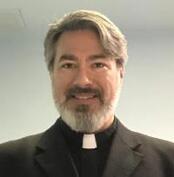 My dear friends in Christ, There is an old joke about a supposedly ancient curse, which says, “May you live in interesting times.” The joke is that it doesn’t really sound all that bad, the prospect of living in interesting times. It sounds, in fact, rather interesting. At least, until one remembers that the most interesting, the most gripping, the most riveting times to read about in history books are times that were full of great strife, upheaval, chaos, conflict, even violence—all the things that also make for interesting and exciting movies and television shows. That’s just it, though. The exciting events and situations that make all those stories from history or Hollywood really interesting … those are generally not the sorts of experiences that any sane person would ever want actually to live through in real life. My friends, it would appear that we are, right now, living in interesting times. I won’t rehearse and rehash the details of the violence and chaos that has been recently and still is being experienced by our neighbors in Kenosha. By now, I’m sure we’ve all seen too many details, too many times. Our own Bishop Matt last Friday issued a powerful and uplifting pastoral letter to the diocese. I commend it to your reading and consideration. I cannot improve upon any of the things that +Matt has said so eloquently, speaking into this deeply troubling moment in our lives together. I can say, though, with some confidence that the shock and horror of these particular incidents on our doorstep will begin to fade, sooner or later. The 24-hour news cycle will rush to latch onto the next shocking and horrifying headline, in the next town or city, and those of us who have the privilege of being able to do so will start to return to life as normal (“normal” itself, these days, being something of a different concept than it used to be). But issues of race and racism, of police and policing, of deep, seemingly intractable divisions in our society—divisions that often render us incapable of agreeing upon even a shared set of facts, much less what to do about them—are not going to go away any time soon. So what do we do? How do we find God in this? How do we find each other? How do we do any of that when we’ve been physically separated from each other, from our church building, from the worship that comforts and sustains us in deeply familiar ways, for half a year? There are, of course, no simple or easy answers to any of those questions. I do invite us all, however, to borrow an idea from our Pentecostal cousins in the Christian faith: the idea of holy chaos. Now, that’s a term that takes some unpacking. Let me begin by clarifying what I don’t mean by it. I don’t mean that the shooting of Jacob Blake was in any way, shape, or form a “holy” thing. I do not mean that a teenager’s choice to carry a rifle across state lines and to murder two protestors and wound a third was in any way, shape, or form “holy.” When I call chaos “holy,” I do not intend to imply that God wills the chaos or inflicts it upon us. As the saying goes, God is good—all the time! No, what I mean by “holy chaos” is that God finds ways to sanctify even the darkest, most evil events and acts and circumstances, turning them always to the greatest possible good and the highest possible purpose in the unfolding of God’s will in God’s creation. This holy work that God constantly does throughout creation is most perfectly demonstrated and exemplified in the broken body of Jesus Christ on the cross, and by the empty tomb on the morning of the Resurrection. It was not God’s desire that Jesus suffer and die, but suffer and die for us Jesus did, and through his suffering and sacrifice God worked the miracle and the mystery of Salvation. We should note that it took centuries for Christians to work out the meaning of everything that happened on that cross. That is not to say we should expect it to take centuries to find God in the midst of our present chaos. The earliest Christians recognized God’s presence in their midst, even in their experiences of persecution, violence, and death. What I’m saying, rather, is that we must be gentle with ourselves, and we must accept whatever grace we can offer each other, as we all struggle to make sense out of this moment in our shared history and to discern God’s will for us in the midst of chaos. For grace abounds, and it will continue to abound. God is yet with us. That is the promise God made to us in Jesus Christ—that he will be with us, even to the end of the age. The age is not yet ended, though some days it may appear that we are at the end of all things. Let us lean on each other, carry each other, lift each other up. For whatever divisions may stand between us, we are united by something greater. We are all bound together by God through Jesus Christ in the Holy Spirit. Let us remember that, always, and be faithful to God and to each other. Amen. Christopher+ Comments are closed.
|
Click here for the latest parish newsletter:
Categories
All
|